What is nudge theory? How do you prepare people for change
What is Nudge theory?
Sometimes we think we want others to make decisions the way we want them to and tell them directly, but this often backfires, even when we have real power over others, such as teachers, parents, bosses, etc. If you have to advise someone who might say no to your decision, using indirect advice has been shown to produce better results.

The Nudge theory first emerged in the United States in the early 21st century as a radical way to influence how people interact with the financial system, particularly pensions, savings and health care, to improve the quality of life in later life.
Sometimes, direct is not as effective as indirect, nudge theory teaches you how to persuade others
One of the most famous examples of Richard Thaler’s Nudge theory, a leading scholar of behavioral economics, was the placement of a fly-shaped sticker at the bottom of a urinal at the Amsterdam airport. Users would inadvertently focus their attention on the sticker in an attempt to eliminate the fly, resulting in a surprising 80% reduction in urine overflow at the urinal where the sticker was placed.
Nudge theory is a theory of behavioral economics. Nudge theory puts forward the concept of nudge: nudge theorists consider the thinking shortcuts used by humans in decision-making (not just economic decision-making), and suggest that in the design, decision-makers can use the knowledge of human thinking shortcuts to think, so that small changes in the environment are more likely to make humans make better decisions.
In the pre-change environment, humans tend to make decisions that are undesirable in the eyes of the decision maker because of the thinking shortcuts they use. The decision maker then needs to make small adjustments to the environment, and humans who continue to act through thinking shortcuts will make better decisions in the new environment. At the heart of nudge theory is the idea that small changes in the environment (small pushes) allow people to take thinking shortcuts and make better decisions.
Nudge Theory Experiment
For example, a group of public health researchers have experimented with this. Their goal is to study what makes people more likely to eat healthily and do a real-world experiment; They go back to the snack bar and assume that consumers think “buy snacks” simply and quickly, so they change the layout of the store (promote) to put healthy snacks (such as fruit and cereal bars) on the cashier and some unhealthy snacks (such as potato chips). Facts have proved that this method can effectively enable consumers to buy more healthy snacks and fewer unhealthy snacks.
Nudge theory have been shown to be useful for social marketing, encouraging people to make the right decisions, such as using less energy, eating healthier, or becoming an organ donor. It also works with people-to-people social interactions, where a little brainstorming and a psychological approach may yield better results than direct appeals.
However, some examples of unethical nudge theory are companies that only offer free trial subscriptions and then have to pay the full price of the subscription at the end of the trial period unless they opt out, and there is usually a complicated process for opting out. Even if the cashier at a fast food restaurant asks if you want to order a set meal, this is an example of nudge theory because most customers will nod their heads without thinking about it.
7 Key Steps of Nudge Theory
- Define change clearly
- Consider change from the perspective of the affected stakeholders
- Use evidence to show the best option
- Present change as a choice
- Listen to feedback
- Reduce barriers
- Use short-term wins to maintain momentum
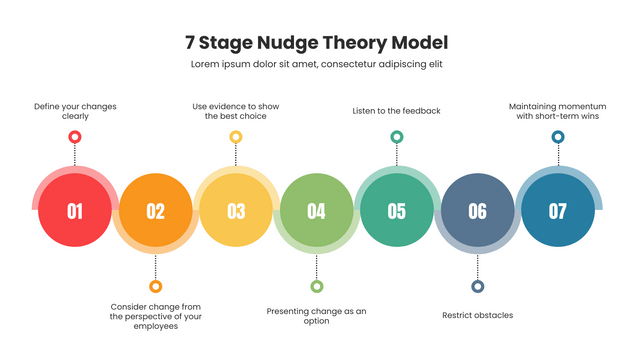
Edit this Nudge Theory Model Template
Ethical Use of Nudge Theory
According to Thaler, because Nudge theory is well used, there are ethical principles for its use, including
- All Nudge actions should be highly transparent and not misleading.
- People can easily choose or avoid Nudge actions.
- Nudge actions should be reasonably believed to be beneficial or helpful to those affected.
Nudge theory is an easy and effective management approach, but it is important to judge these three principles before applying it in order to achieve the goal successfully without impeding the individual’s freedom of choice.
More Nudge Theory Examples and Templates
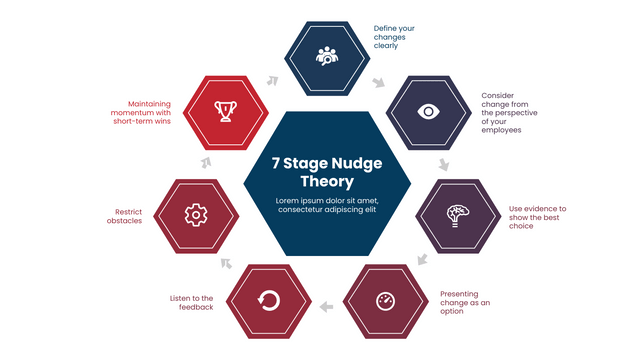
Edit this Nudge Theory Model Template
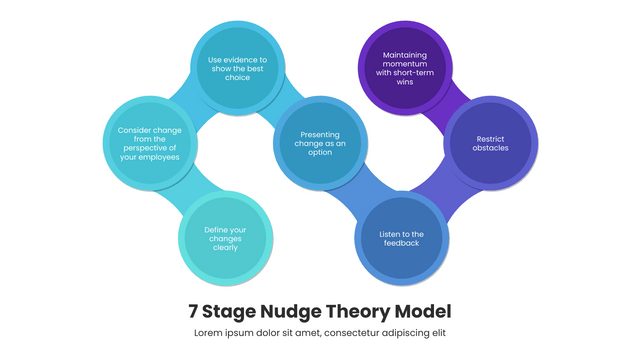
Edit this Nudge Theory Model Template
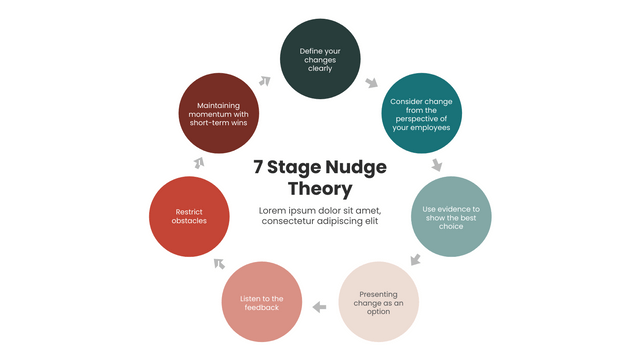
Edit this Nudge Theory Model Template
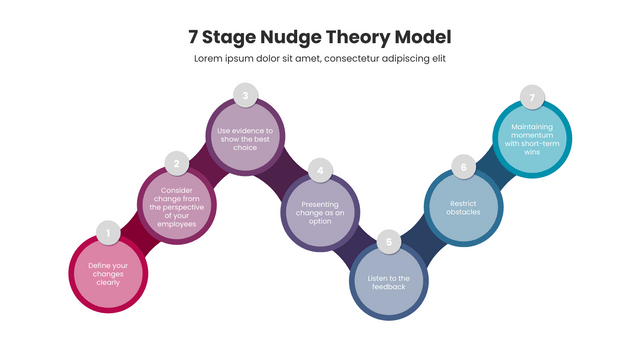
Edit this Nudge Theory Model Template

Edit this Nudge Theory Model Template
This post is also available in Deutsche, Español, فارسی, Français, Bahasa Indonesia, 日本語, Polski, Portuguese, Ру́сский, Việt Nam, 简体中文 and 繁體中文.
















